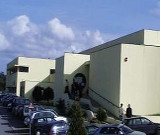Chitinase 3-like 1: a promising therapeutic target in pancreatic cancer
Anfitriã: Flávia Barbosa (Doutoranda em Ciências Biomédicas no IUCS-CESPU)
Palestrante: Cristina Pinto Ribeiro Xavier
Afiliação: Associate Laboratory i4HB - Institute for Health and Bioeconomy, University Institute of Health Sciences - CESPU, Gandra, Portugal; UCIBIO - Applied Molecular Biosciences Unit, Toxicologic Pathology Research Laboratory, University Institute of Health Sciences (1H-TOXRUN, IUCS-CESPU), Gandra, Portugal; i3S – Instituto de Investigação e Inovação em Saúde, Universidade do Porto, Porto, Portugal
29 de maio | 12h
Campus Universitário de Gandra | Ed. 3 | Sala 3128
ENTRADA LIVRE
Resumo:
Pancreatic ductal adenocarcinoma (PDAC) is one of the most aggressive malignancies worldwide. Unfortunately, PDAC remains associated with an extremely poor prognosis, with lack of alternative therapeutic strategies hampering the effectiveness of treatment. Our previous work demonstrated the involvement of Chitinase 3-like 1 (CHI3L1) in PDAC cellular resistance to gemcitabine, and found that pentoxifylline, an antifibrotic drug and an inhibitor of CHI3L1, was able to counteract such drug resistance. Therefore, our work opened new perspectives on the possibility of exploring drugs that target CHI3L1 in combination with conventional chemotherapy, to overcome drug resistance in PDAC.
To identify putative inhibitors of CHI3L1, in silico molecular docking was performed using the DrugBank database. Several drugs were identified with higher affinity towards CHI3L1. On of these drugs was darifenacin (a muscarinic receptor antagonist) that reveals to target CHI3L1 with high efficiency. Then, further studies were conducted to evaluate the chemosensitizing effect of darifenacin. Our work showed that darifenacin inhibited 50% of the growth (GI50) of two PDAC cell lines (BxPC-3, PANC-1) at around 20 µM (Sulforhodamine B assay). A similar effect was observed in a primary PDAC cell line obtained from a resected patient (GI50 of 30 µM). Interestingly, at concentrations above 50 µM, darifenacin did not cause significant cytotoxic effect against the normal immortalized pancreatic ductal cells. Importantly, darifenacin sensitized human PDAC cells to standard chemotherapies, such as gemcitabine and gemcitabine plus paclitaxel. Using molecular approaches, we verified that darifenacin reverted CHI3L1-induced PDAC cellular resistance to therapy, and decreased Akt phosphorylation (ELISA). Furthermore, an association between high cholinergic receptor muscarinic 3 (CHMR3) expression and reduced therapeutic response to gemcitabine was observed in a cohort of 68 PDAC patients (immunohistochemistry).
Overall, our work highlights the potential of using darifenacin (and other CHI3L1 inhibitors) as chemosensitizers for PDAC treatment.
Nota Biográfica:
Cristina Xavier is an invited Assistant Professor at CESPU-IUCS, and a Researcher at i3S-Porto. In 2006, Cristina Xavier graduated in Applied Biology from the University of Minho, and in 2010, she completed the European PhD in Biological Sciences at the same University, in collaboration with the Institute of Cancer Biology in Denmark. Then, Cristina Xavier had a Postdoctoral contract at the Institute of Cancer Research, UK, between 2012 and 2015 (for 3 years) to work on the identification of novel molecular targets in pancreatic cancer and disclosing the mechanisms of action of novel synthesized compounds with anticancer activity. In 2015, Cristina returned to Portugal, and joined the Cancer Drug Resistance Group at i3S, Porto. At i3S, she worked as a postdoctoral researcher for 8 years, focusing on understanding the role of the immune microenvironment in drug resistance, particularly the role of extracellular vesicles secreted by macrophages in pancreatic cancer drug resistance. She was also actively involved in the identification of new drugs and synthesized compounds to target non-small cell lung cancer. Currently, her main scientific interest is to identify novel combination therapies with Chitinase-3-like 1 inhibitors to counteract drug resistance in pancreatic cancer. Cristina Xavier published so far 36 papers in index journals, she is co-supervisor of 5 PhD students and she supervised/co-supervised 11 master students (one in progress).








